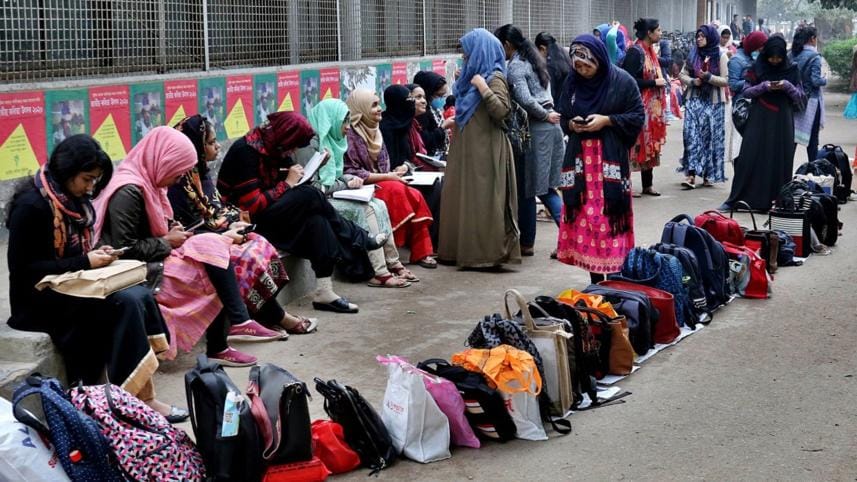Is BCS creating a mismatch and imbalance in the job sector?

It is 8.30 in the morning. Suman, a fourth-year student of one of the well-reputed universities of Bangladesh, walks towards the central library of his university. A wave of students is approaching the library at the same time. It may be a heartening sight for many, unaware of the reason behind the crowd. They are likely to assume that it's natural for university students to congregate daily at the library—an important place on campus where learning is shared, strengthened and enhanced.
But the reason for the congregation is not a class project, or to learn from the latest journal articles, or to conduct research. They are gathering there to prepare for what is now one of the most lucrative jobs that many students crave: Bangladesh Civil Service.
The scenario inside the library is bewildering: MP3, Oracle, Assurance, and Confidence publications' books and materials are strewn everywhere, occupying every imaginable space and study table of the library. These books and materials are specially designed for government job aspirants to help them prepare for the BCS examination. Some use the partition board of their table to stick a world map. Floor space is also scant. All the while, a layer of dust gathers on the classic books, reference materials, and research journals on the library shelves as they remain untouched even out of curiosity.
This scenario plays out not just in Suman's university; most universities in Bangladesh, including the technology-focused ones, are also overwhelmed by the BCS fad. Dr Muhammed Sadique, former chairman of Bangladesh Public Service Commission, said in an interview that reformation in salary structure has attracted many graduates to compete for a government job. Even many engineering students from BUET as well as medical students, with their extraordinary training and opportunities, who can usually get a job just after graduation with nearly twice the salary (or more) of a BCS cadre, are also preparing to sit for the BCS examination in large numbers. This is indeed a trend.
Social status, prestige, power, economic benefit, and a stable job are becoming critical issues for many graduates. Moreover, the current socio-economic and political trends seem to provide signals for most students to lean towards government jobs. According to some, salary is not the only reason behind the trend; the perks of the job fashioned by one's imagination, network, and skilled craft are also driving many to seek the lucrative BCS job. In less than six years, the number of applicants has doubled—from 244,000 applicants in 35th BCS to 475,000 applicants in 41st BCS (with the exception of 39th which was "special")—and surpassed all previous records. The curve continues to reflect a rising trend.
No one can underestimate the importance of recruiting skilled civil servants for the proper functioning of a state. Their skills in administration, due process, fairness and justice can be a boon for the citizenry. But is a biology, medical or engineering student, vying for an administrative position, placed in the appropriate technical position (agriculture, health services, or infrastructure development)? Are they contributing in the areas in which they may have developed core skills? Or are they going to the police, income tax, or some other government service that is misaligned with their basic area of training, never again to be used? If the investments made in training our human resources in certain sectors are diverted to sectors in which they must be retrained, the initial training becomes useless and the investment loss can be colossal.
The current trend may in fact be placing the private sector on a precarious edge. According to a report by the Transparency International Bangladesh, every year USD 3.1 billion are being officially drained from Bangladesh's foreign exchange coffers by expatriate employees simply because the industry is unable to recruit locally. The real drain is likely more serious than what the TIB report portrays. Lack of skilled people required to work in the private sector has paved the way for foreign workers to come in and command lucrative salaries, despite there being millions of local unemployed graduates.
A survey by the Academic Experience Project on students' satisfaction provides additional insights by focusing on whether a university degree relates to future careers: more students than one can imagine believe that university education and job prospects are simply not related. And with students now aiming straight for the BCS, will it be possible for the universities—their faculties and curriculums—to satisfy them with subject-specific knowledge? Let alone research, a big chunk of students does not even focus on their area of academic studies. They just want a certificate attesting their completion of a four-year graduation degree to compete for the BCS.
The desire for government jobs, which are limited in numbers, may have also made many graduates jobless. With the age limit to apply and obtain a government job being thirty, many keep trying multiple times while avoiding seeking a job in their majors. And if they fail to manage a government position within the age limit, there is a high likelihood that they will remain jobless for a considerable period of time. The private sector, it is generally understood, recruits fresh graduates within one year of their graduation.
The mismatch between a student's area of study and the jobs they are seeking cries out for a need to coordinate academic studies with employers across the board, including the government. The time is ripe for a serious reconsideration to rethink ways of encouraging students to pursue careers in their respective academic fields. This is not only for academia to tackle and address—it's about government policy regarding job creation in a variety of fields and the involvement of the private sector in partnership with academia to build appropriate supply chain linkages which will assure remunerative and meaningful jobs for the large pool of graduating students. The trend to obtain government jobs, driven by its incentives, must also be re-evaluated.
Iqramul Gafur is working on his MBA degree at IBA, University of Dhaka. Syed Saad Andaleeb is Distinguished Visiting Professor at IBA, University of Dhaka, and former Vice-Chancellor, BRAC University. For more information on The Academic Experience Project, contact Dr Andaleeb at bdresearchA2Z@gmail.com.




 For all latest news, follow The Daily Star's Google News channel.
For all latest news, follow The Daily Star's Google News channel.
Comments